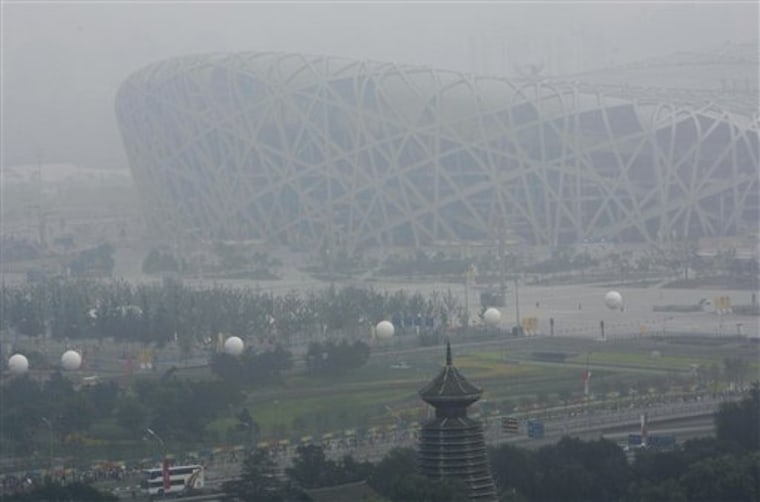Heat, humidity and haze cloaked the start of China's long-awaited Olympic Games in a sultry blanket Friday.
Temperatures in the National Stadium, known as the Bird's Nest, averaged about 86 degrees Fahrenheit in advance of opening ceremonies, and moderate humidity made the air feel heavier.
The noxious air has been a major headache for Olympic organizers, with athletes voicing concerns over the potential impact to their health and performance. Beijing's air pollution regularly reaches levels two or three times above what the World Health Organization considers safe.
On Friday, the official air pollution index for Beijing was at 94, similar to levels of moderate pollution recorded earlier in the week. The WHO recommends levels below 50 for healthy air, while China considers anything above 100 to be harmful to sensitive groups including children and the elderly.
For U.S. swimmer Garrett Weber-Gale, the first view of the skies over Beijing as he was flying in earlier this week was a shock.
"I really noticed the first day that it was pretty smoggy. We landed on the plane and I think we were all like, 'Wow. Is this weather? Is this smog? Is this fog? What is it?' It was kind of surprising to see that," he said.
Officials: Fog, not smog
Beijing officials on Friday continued to insist that the murky haze enveloping the city is not the result of pollution, but instead is fog created by moisture vapor in the air. Visibility, they say, is not necessarily an indicator of air quality.
"The air quality, I think it's good. It looks a little bit misty. You cannot judge the air quality by its appearance. You have to trust the scientists," said Wang Wei, executive vice president and secretary general for Beijing's Olympic Organizing Committee.
China has invested billions in "greening" the capital, and implemented drastic measures to ensure air quality for the Olympics. Last month, some 2 million cars were taken off roads, constructions sites were shut down and dozens of factories were closed across the capital. Similar measures were taken in surrounding provinces.
Du Shaozhong, deputy director for Beijing's Environmental Protection Bureau, said the measures have succeeded in reducing the level of major pollutants, including particulate matter. The first three days of August showcased clear blue skies and very low pollution, though the last five days have been thick with haze and moderate pollution.
"All those results have brought us to the gate of the Olympic Games. We will be able to ensure that air quality during the games is good enough," he said.
Weekend rain expected
The next few days are expected to bring a respite in the form of rainshowers.
Guo Hu, director of Beijing Meteorological Observatory, said satellite pictures show heavy clouds moving in from the northwest and predicted heavy rain sometime this weekend.
"With this rain, we expect the weather in Beijing to be clearly improved," he said. "We have to look at the favorable weather conditions which can help spread and remove major pollutants."
The International Olympic Committee said this week that the air in Beijing is safe for athletes, though they will be monitoring pollution levels regularly. Outdoor endurance events, including the marathon, may be postponed if levels are too high.
In the meantime, some Olympic athletes say they are less concerned with pollution than they are with Beijing's heat and humidity.
"They turned the factories off. A lot of the roads are blocked off, so there aren't as many cars. I think it's in the best condition it has ever been in. But it's still very hot and very humid, and it's pretty tough. I've practiced out there the last two days and it is probably the most humid place I've ever played," said U.S. tennis player Sam Querrey.
